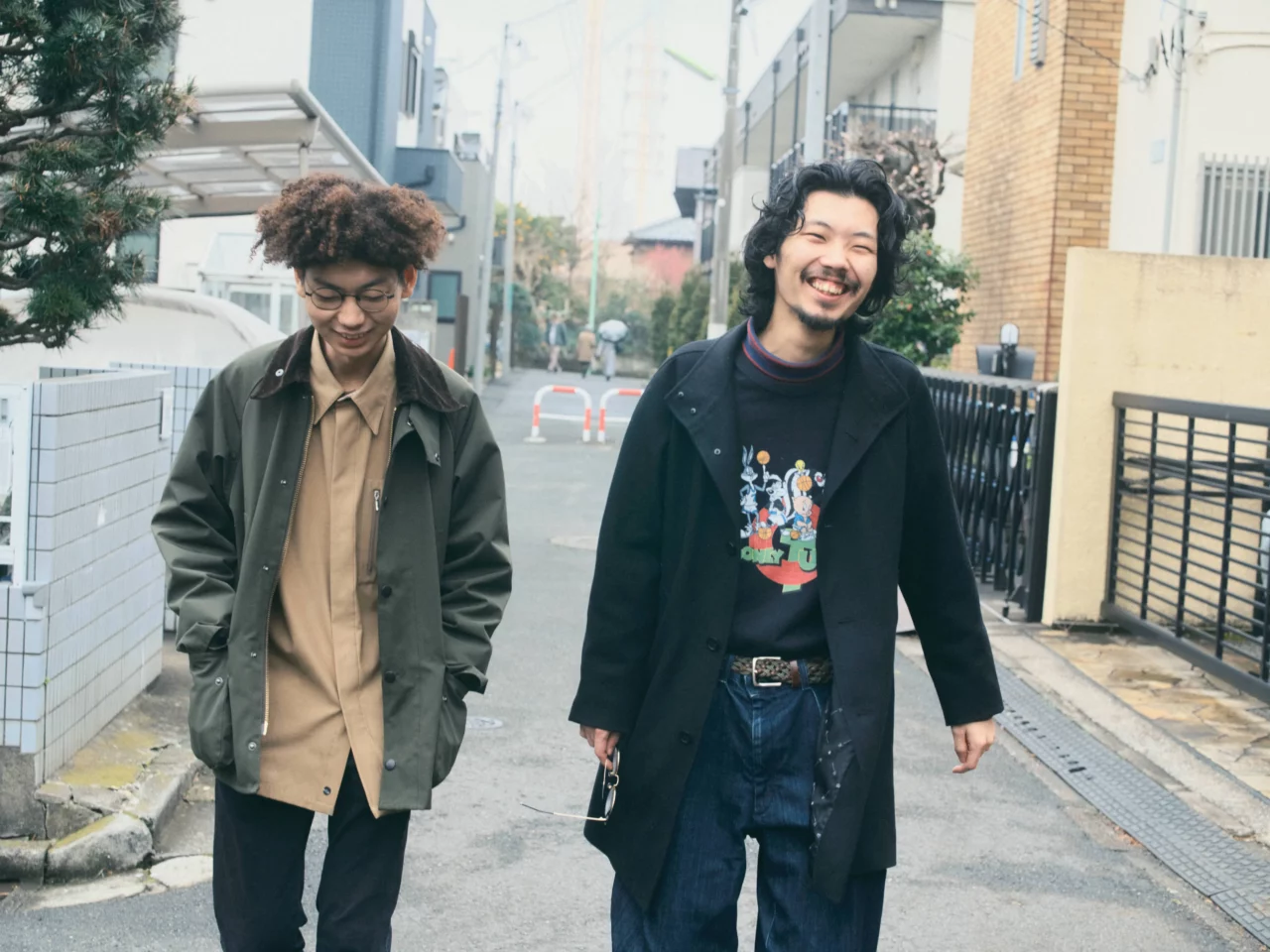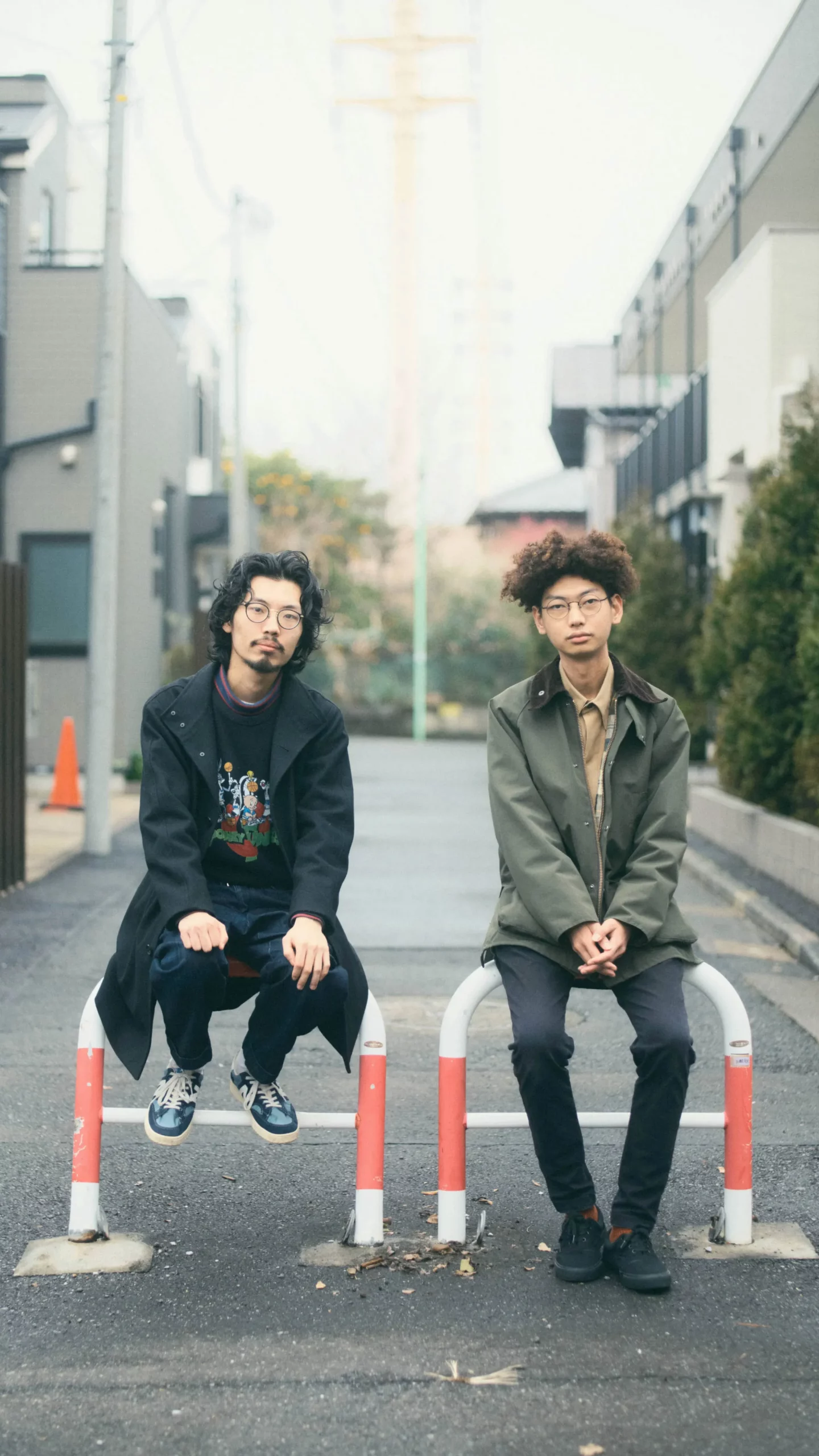Chappo, one of the brightest new acts to emerge from the Kakubarhythm label, has completed their first full-length album, a one & a two. The duo — Oto Fukuhara and Yuta Hosono, both born in 2000 — came together in 2019, but the early years were spent quietly honing their craft through the isolation of the pandemic. It wasn’t until 2023 that they finally stepped into the spotlight with live shows and official releases.
With a one & a two, Chappo channels the lineage of instrumental pioneers like YOUR SONG IS GOOD and SAKEROCK, while pulling in contributions from labelmates such as Ålborg and Omoide Yaro A Team. But rather than simply echoing these influences, Chappo steers the sound somewhere uniquely their own — a curious, textured mix of instrumentals, ambient layers, spoken word, and vocals. It’s in that slightly skewed, unpredictable quality that their music finds its most compelling voice.
The duo’s origin story borders on the folkloric. Drawn to the music of the 1940s, Fukuhara once showed up uninvited to the office of Haruomi Hosono — Yuta’s grandfather — simply to talk about the era’s songs. From that bold encounter, a musical partnership began to form between two people who seem, at once, completely opposite and uncannily in tune.
Their story is already intertwined with a cast of distinctive collaborators — label founder Wataru Kakubari, novelist Asako Yuzuki, who contributed writing to their “Meshi” project, and many more. Following their path is a joy in itself. As they push off into the deeper waters of their musical journey, the question isn’t whether they’ll find their place — but just how strange and wonderful that place might be.
INDEX
It All Began with a Bold Visit to Hosono’s Office
“Oto Fukuhara” is quite a striking name. Are your parents music lovers?
Fukuhara (Gt / etc): Not particularly. But my father was a TV producer, and at the time he was working on a music show. Apparently, he collaborated with Hiro Tsunoda. Tsunoda-san had named his child “Rhythm” (Rizumu), so maybe that had some influence.
When I’m with people like Yuta Hosono or Milo Oyamada (who supports our live shows and is Keigo Oyamada’s son), people often start asking whose kid I am. But in my case, my parents aren’t famous or anything like that.
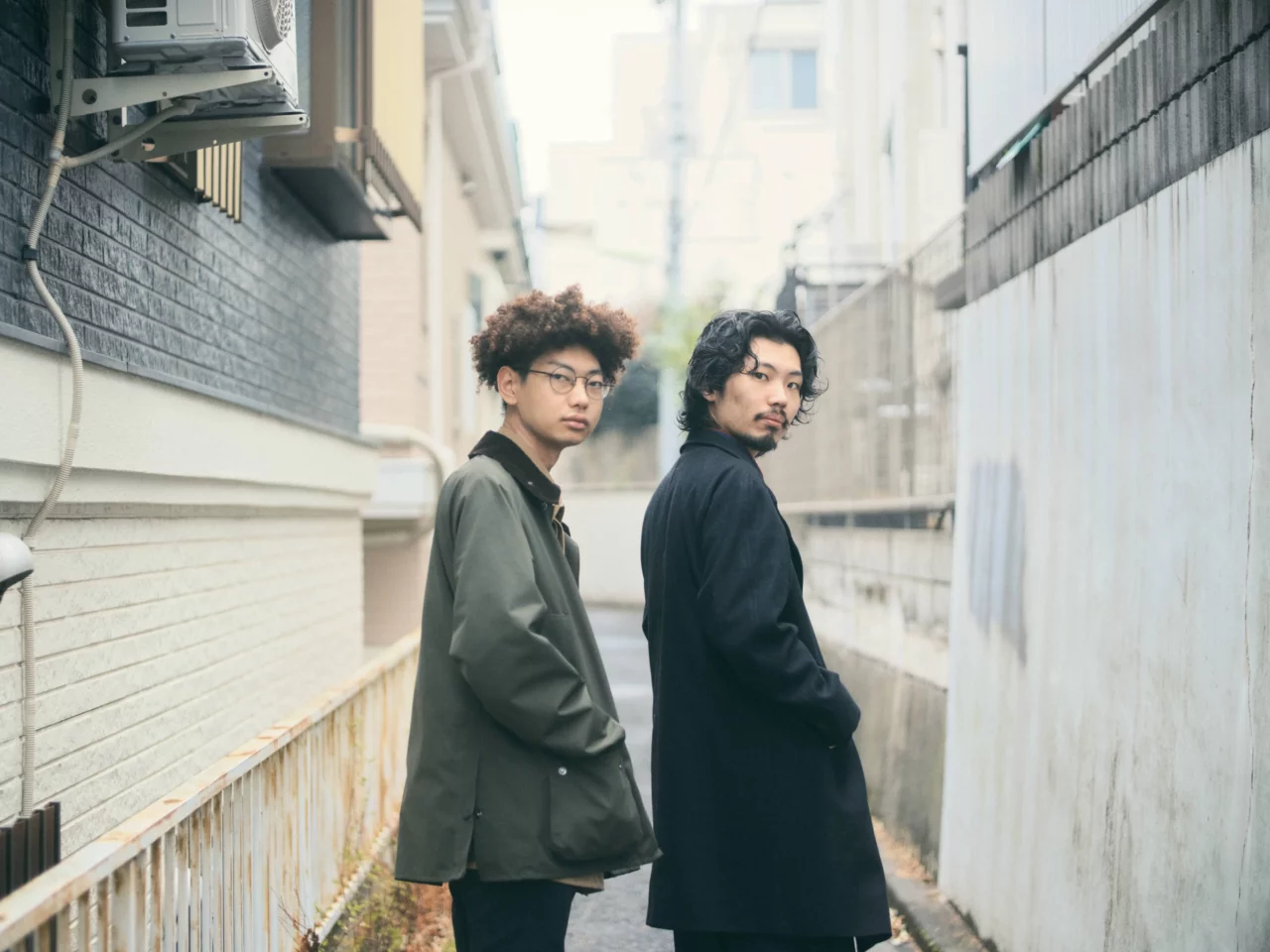
Formed in 2019, Chappo is an instrumental band consisting of two musicians born in 2000. On December 13, 2023, they released their debut single “Fukidashi” as a 7-inch vinyl through Kakubarhythm. Rooted in 1940s popular music and film scores, their sound blends various elements beyond music, infused with a strange, unique sensibility. A duo on a quirky and unpredictable journey with no clear destination.
Oto, you were drawn to 1940s music and even visited Haruomi Hosono’s office to talk about it, which eventually led to your meeting with Yuta, right? [laughs] What was it that attracted you to 1940s music?
Fukuhara: I’ve always had an interest in history, so as a kid, I loved exploring old things and finding how they connect to the present. Aside from music, I also practiced haiku. I’m from Ehime, where there’s a rich haiku culture, and I studied under the renowned poet Itsuki Natsui. I did haiku for about ten years, starting when I was in elementary school.
As for music, I began playing the guitar when I was about 10. Before that, I played baseball, but I soon realized that the kids who started early or had their dads as coaches were always the best, which made me aware of the social dynamics at play.
Hosono (Ba / etc.): You started at 10? That’s pretty early! [laughs]
Fukuhara: Yeah, so I decided to try something that no one else was doing, and I chose the guitar. Even back then, I was drawn to older music—bands like Cream and The Band. But it was actually due to an illness that I became really drawn to 1940s music.
When I was in middle school, my asthma worsened, and I was frequently hospitalized. During that time, I became obsessed with RKO* films and 1930s musicals. They created these huge sets that you couldn’t imagine today, and they had such a dreamlike atmosphere, which became really comforting for me. That’s when I started to really appreciate the music from that era.
*RKO Radio Pictures: A major American film production and distribution company.
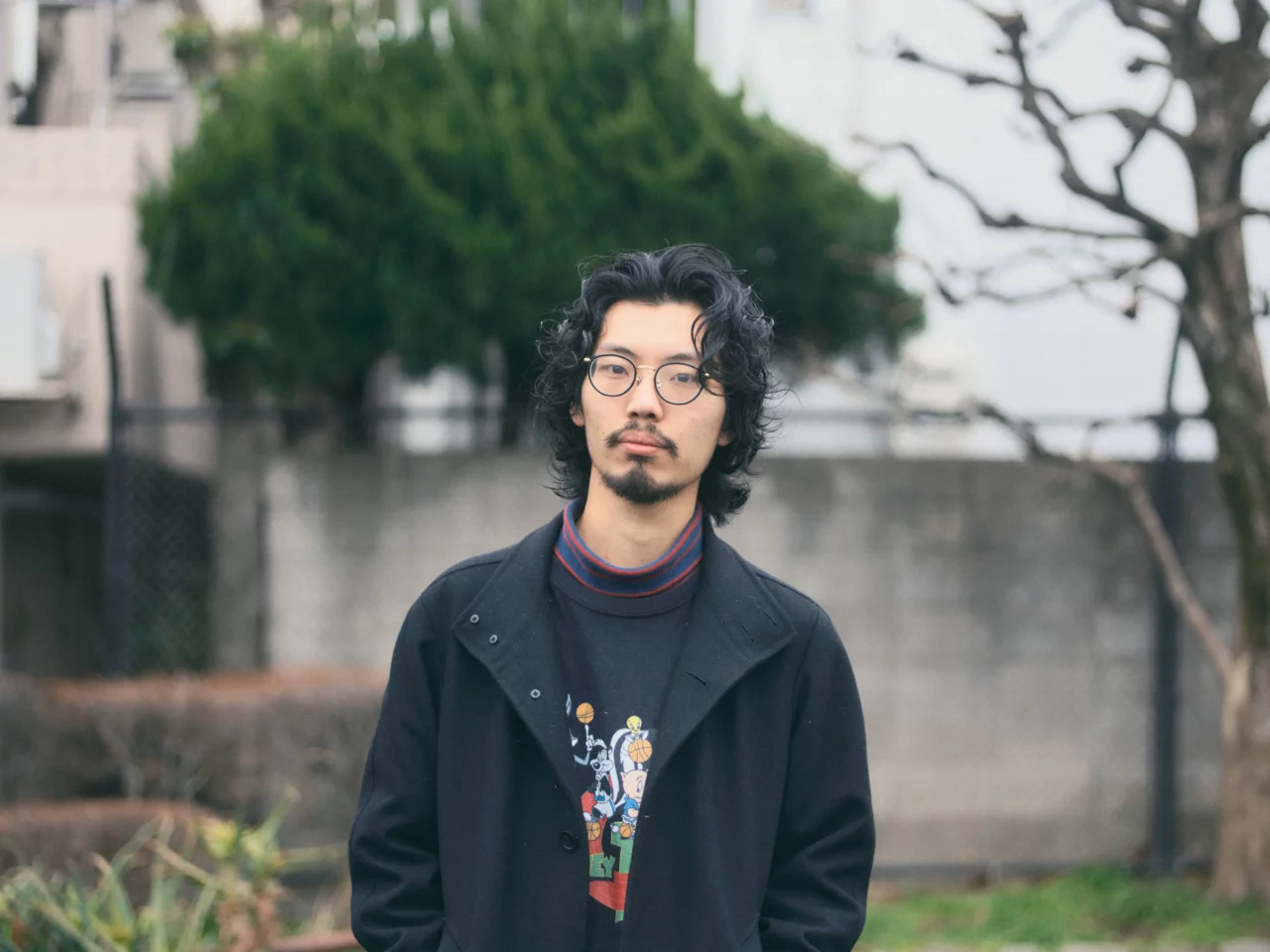
It sounds like it was a bit of an escape from reality.
Fukuhara: Yes, it was like a sanctuary for me.
INDEX
Understanding My Grandfather’s Work and Influence (Hosono)
You ended up getting close with the Hosono family, and I heard that Yuta’s mother suggested you meet Yuta and invited you to a university club’s welcome party. Yuta, at first, thought “this guy is trouble,” but you two became friends. How does Yuta see you now?
Hosono: I thought he was a really interesting guy from the start, but recently, it feels like we have even more in common. Our daily interests seem to overlap more now. In the beginning, he used to come over to my house, and I would talk to him about music, so it was more like the relationship of a teacher and a student. But now, it feels more like a regular friendship.
Yuta didn’t listen to much old music back then, and Oto ended up introducing him to the music of Haruomi Hosono. Is that right?
Hosono: Yes, that’s correct.
Fukuhara: When we first met, it felt pretty strange. It was like, “There’s no connection to that old man,” and I felt there was a certain distance between us, which was much stronger back then than it is now.
Yuta, what kind of music were you listening to before meeting Oto?
Hosono: I liked techno and house music. In high school, I joined the jazz club and started playing bass, which led me to listen to Japanese jazz fusion. But I wasn’t deeply interested in it at first, I didn’t dig into it much.
Also, when I joined the jazz club, there was no one else playing bass, so I thought, “My grandfather did it, so I might as well give it a try.” It was a pretty reluctant start, but over time, I started to enjoy it.
So, while you liked music and instruments, you weren’t digging too deep into it, and then Oto came along and helped you get more immersed in it.
Hosono: Exactly. It felt like a history lesson—learning about what my grandfather did and the impact he had.
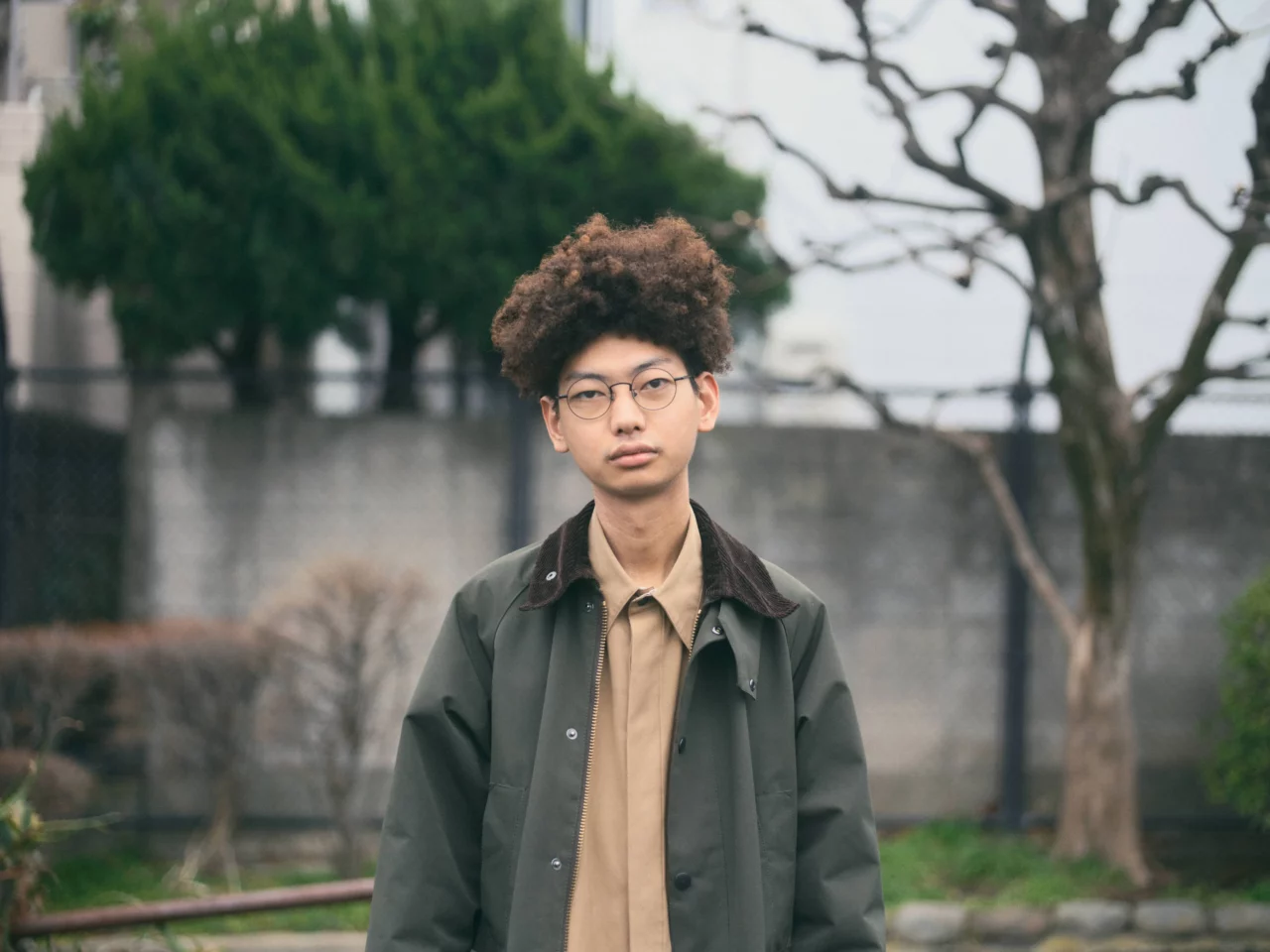
INDEX
Haruomi Hosono’s Influence on the Duo: “Before You Know It, You’re Dancing on the Palm of His Hand”
It seems like Haruomi Hosono’s advice played a significant role in you both starting Chappo. Can you share how that happened?
Fukuhara: He didn’t explicitly tell us to do it, but before we knew it, we were dancing on the palm of his hand, in a way [laughs]. It wasn’t like he was saying, ‘You absolutely have to do this,’ but somehow he ended up naming the band for us and was always nearby, guiding us without us realizing it.
Hosono: Before we knew it, we were even playing as his backing band.
What does Haruomi Hosono represent to each of you today?
Fukuhara: For me… he’s like ‘a friend’s grandpa.’ Or maybe ‘my own grandpa.’ Since I never had a grandfather growing up, I can imagine him being like that. I still find myself amazed by him at work sometimes. But back then, he felt like a much more monumental figure, someone who could talk about 1940s music. I almost felt like a student at times. But now… he feels like my friend’s grandpa.
Hosono: I have the opposite feeling. I’d only ever seen him in a family setting, so I used to think of him as just a mellow, old man [laughs]. Even though I used to go to his live shows, I’d sometimes fall asleep. But recently, after hearing stories from Oto and playing music together, I’ve realized just how incredible he is. He’s done so much, and yet he doesn’t boast about any of it. I’m starting to respect him more now, even though it’s a bit late to feel this way.
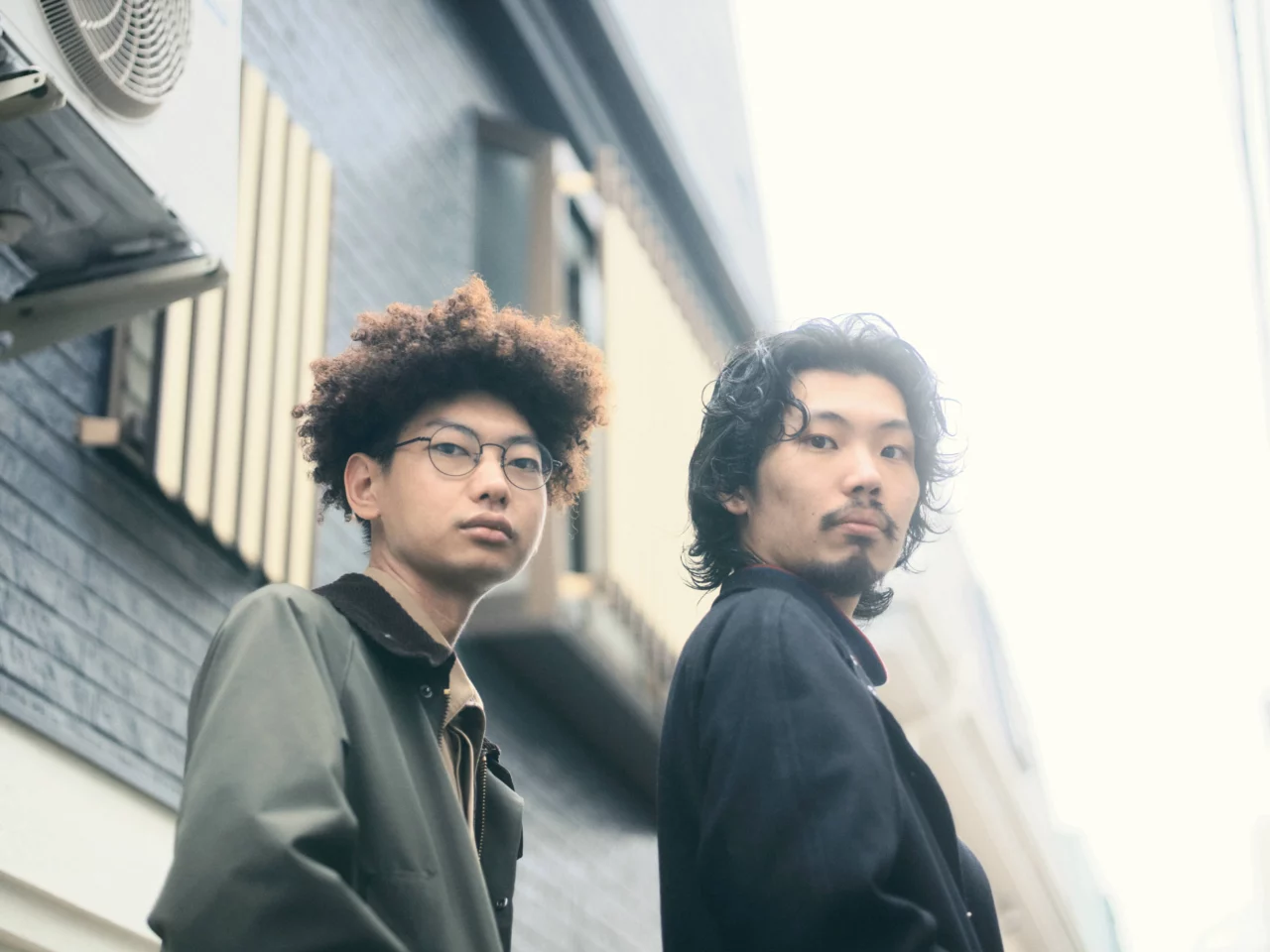
Even before meeting Oto, you were into techno, which, if you trace it back, leads to YMO, right?
Hosono: Yes, exactly. Actually, no matter what genre of music you trace back, YMO is always there in some way.
Fukuhara: Whether you’re doing rock or ambient music.
Hosono: There might be some unavoidable influence [laughs].
INDEX
We had never heard of YOUR SONG IS GOOD or SAKEROCK.
The formation of Chappo dates back to 2019, but after going through the pandemic, they spent a long time just practicing and writing songs, which they humorously refer to as their “underground era.” They didn’t start their visible activities until 2023, and their first release came about after meeting Kakubari. The initial demo they handed over included both instrumental and vocal tracks, but under Kakubari’s guidance, they decided to debut as an instrumental band.
Hosono: The very first song we made was one by Oto, and it had lyrics, right?
Fukuhara: Which song?
Hosono: Wasn’t it “Meshi”?
Fukuhara: Then it must be an instrumental track.
Hosono: Oh, so we actually started as an instrumental band.
Fukuhara: We did. In fact, there were more vocal tracks on the demo, but I didn’t really follow through with them because I thought it was “embarrassing” [laughs].
So it wasn’t like we had the intention from the start to be an instrumental band.
Fukuhara: That decision was completely made by Kakubari-san. Honestly, we didn’t have any strong intentions. We weren’t worried at all about how people would perceive us, but having someone like Hosono-san around did put a bit of pressure on us—like we couldn’t just casually jump into the scene. That’s when Kakubari-san paved the way for us, saying, “Let’s go with instrumental,” and since we could create instrumental music, we were fine with it.
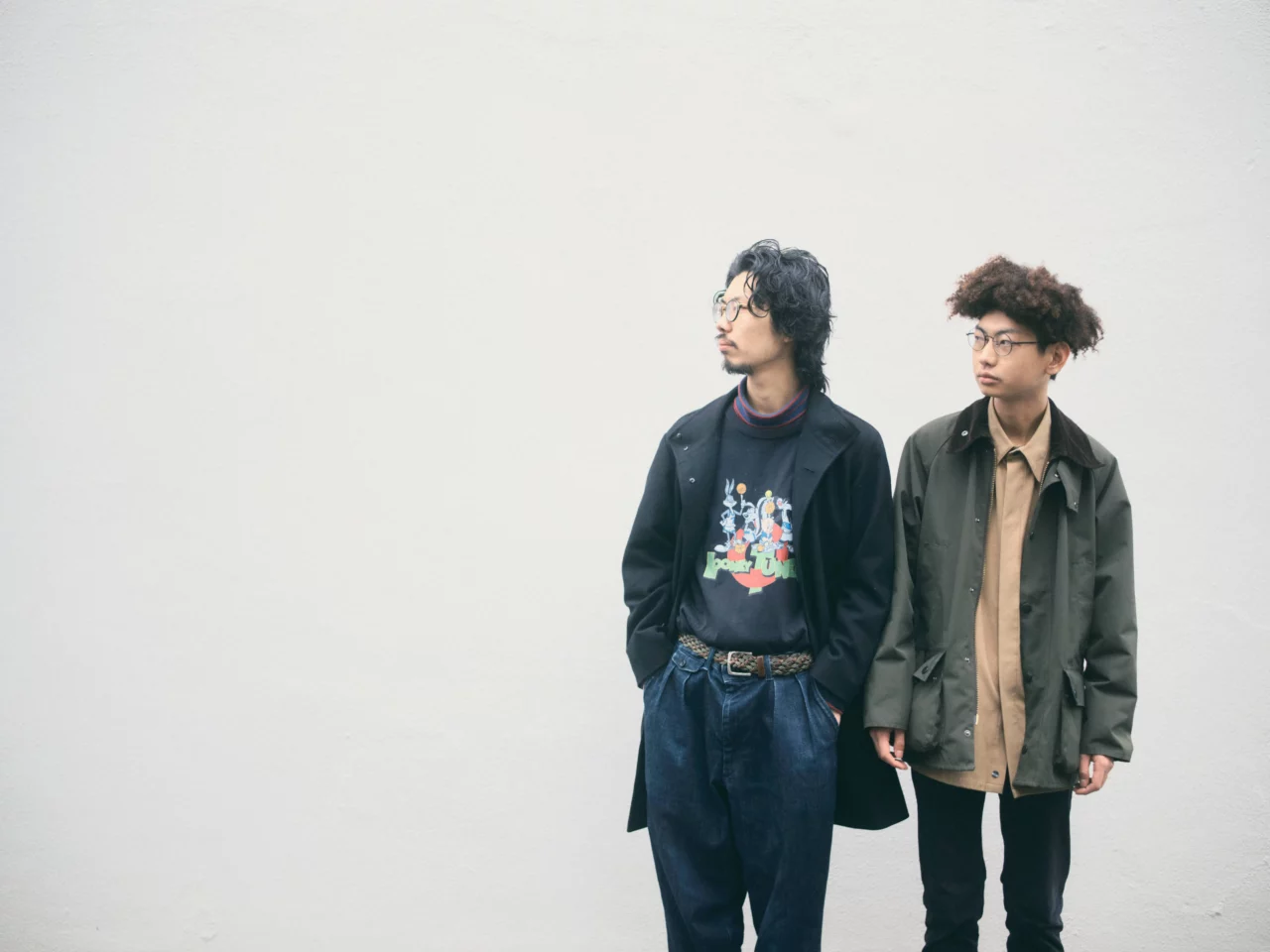
YOUR SONG IS GOOD and SAKEROCK both have instrumental music as part of their identity, and that style aligns with the label color of Kakubari Records, right?
Fukuhara: At the time, we hadn’t really listened to either YOUR SONG IS GOOD or SAKEROCK, so we thought, “Instrumentals are the tradition these days” [laughs]. For us, even though our instrumental tracks usually have lyrics and vocals, the most important thing is that there’s no real separation between them.
While you certainly have an affinity for 1940s music and the pursuit of boogie-woogie and swing, Chappo’s music isn’t simply a direct reflection of that. The approach to whether it’s instrumental or vocal, or the genre, arrangement, and era, isn’t strictly defined. It feels like you’ve just been accumulating things that you find interesting, and that’s what formed the album.
Fukuhara: I think during our “underground era,” we went too far with that approach. We’d stop making something if it started to sound too similar to something else. For example, if a bass line sounded too typical or if it felt like it evoked New Orleans, we’d just stop. As a result, things got more and more confusing.
INDEX
Delicious, Long-Lasting, and Inherently Japanese
Defining Chappo’s music within an existing genre is difficult, but when the band was formed, you introduced the concept of “Yokan (Japanese dessert) Music.” Is that concept still something you keep in mind?
Fukuhara: I’m not sure if Yuta is consciously thinking about it… I’d say he probably isn’t, right?
Hosono: (Nods silently) Yeah, I guess I vaguely remember that.
Fukuhara: I’m pretty conscious of it, actually. It’s kind of at the core of what we do.
The concept of “Yokan Music” is said to imply something like “sweet, delicious, fun, but with depth.” Does that meaning hold a deeper significance for you now?
Fukuhara: I think about “Japanese-ness” quite a lot. I studied philosophy in university, and with my background in Japanese aesthetics, I’ve always felt a desire to express more of the “innate sensibilities of the Japanese people” in our music, rather than trying to catch up with Western culture.
Yokan has become a nostalgic thing, but it’s still something we’re familiar with, and the joy of sweetness hasn’t changed. “Sono Ato” (The After) was created with this concept in mind. It’s about Japanese-ness that hasn’t been commercialized or turned into a fashionable trend, a subtle, everyday orientalism rather than something easily understood or exotic.
Yōkan might have a unique position, right? It’s not quite like rice, where it’s considered “the representative food of Japan,” but it’s something everyone knows and feels a sense of “Japaneseness” from.
Hosono: Yeah, it’s like something deeply ingrained in our collective subconscious.
Fukuhara: I think it’s pretty cool that something so sweet can have such a dark color [laughs].
Yōkan is a preserved food, so the idea that “it can be enjoyed for a long time without being consumed quickly” makes it a good metaphor for music.
Fukuhara: Yeah, that’s a really good point.
I also looked it up on Wikipedia, and apparently, the unit for counting yōkan is “sao.” Since you both use “sao” instruments like the guitar and bass, it feels like a perfect fit [laughs].
Fukuhara: Wow, this is turning into a really well-constructed story. It used to be part of my “black history,” but now it feels redeemed.
All because of yōkan.
Hosono: Great episode, I’m glad we had this one.
